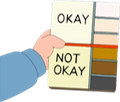Yes yes, language changes over time. I’ve heard that mantra for decades and I know it. That doesn’t mean there aren’t language changes that aren’t grating when they become fashionable (and hopefully temporary).
For me, “morals” being used as a crude catch-all application of “morality,” “ethics,” “integrity” or related concepts bothers me. Sentence example: “Maybe if society had morals there wouldn’t be so many minorities in prison.” 

An even more annoying otherwise-fluent-speaker modification I see is when “conscious” is used to mean “consciousness” and “conscience” interchangeably. Sentence example: “Single mothers on welfare that steal baby formula have no conscious.” It sounds like they’re saying the shoplifter is not mentally aware of their own actions, not that they’re lacking sufficient “morals” to let their baby starve for the sake of Rules-Based Order™.
There’s others, but those two come up enough recently, with sufficient newness, for me to bring them up here. Some old classic language quirks are so established and entrenched that even though I hate them, bringing them up would likely invite some hatemail and maybe some mystery alt accounts also sending hatemail after that. You know, because they “could care less(sic)” about what I think. 


I’ve given up on trying to correct people for the most part because language does change over time and new norms are established whether or not I’m comfortable with them. Sure, some of them are clumsy and staggeringly incorrect (like “conscious” being used in place of “conscience”) but if it’s done enough times, it’ll become the expected way to communicate.